The accolades poured in for Jean Chretien, Prime Minister of Canada from 1993 to 2003, as he became a nonagenarian in January. They came even from some unlikely sources, such as former Conservative prime minister Stephen Harper.[1]
Chretien’s enduring success flows from his mimetic, mirthful mendacity, his masterful dissembling which envelopes everything in a fog of confusion and yet also simultaneously seems good-natured, entertains us, makes us laugh, and then makes us forget why we were angry at him in the first place. I genuinely had a lot of fun finding and listening to these olds excerpts of Chretien’s greatest hits and leafing through his memoirs; he does make me laugh, and you can’t stay angry at someone who makes you laugh. I hope that you will enjoy some of the highlights as well.
The Shawinigan Handshake
When Chretien declared 16 February 1996 as the first National Flag of Canada Day, he probably did not expect to embroil himself in controversy and create a meme that persists nearly thirty years later.
Chretien plowed through the protesters and forgot that several journalists were standing right there recording his every move. His expression and demeanour before the scum of journalists reminds me of how a dog or cat looks when you catch them in the act of doing something bad, like stealing butter off the kitchen table.
Journalist: “You didn’t lunge at him, did you?
Chretien: “I don’t know. What happened?
Journalists: “I don’t know.”
Chretien: “Well, it seems we don’t know. The cameras were there. Some people came in my way; it might have been – I had to go. So if you’re in my way, I’m walking. So I don’t know what happened. It happened, something to somebody who should not have been there.”
Chretien choked and pushed an obnoxious separatist protester out of his way and would once again have become an internet meme in that moment if the social media had existed in 1996; as it happened, the Shawinigan Handshake became a pre-Internet meme (under Richard Dawkins’ original definition) in its own right even in the 1990s. Today it has generated countless modern memes online. Chretien gleefully spent much of the late-2000s and 2010s mock-choking various politicians and politicos for laughs, from Rick Mercer to Bob Rae. A micro-brewery in Quebec called Le trou du diable (The Devil’s Hole) has even named a “pugnacious strong ale” in honour of Chretien, “The Shawinigan Handshake.”
Chretien recounted the famous incident in his second memoir, My Years as Prime Minister.
Occasionally some demonstrators will yell something unpleasant, but they’re quickly told to shut up by everyone else or are controlled by the police. This time, however, I was unhappy that the organizers and security people hadn’t done their jobs properly by preparing me for what was to come. I gave a short speech and headed back to my car. My bodyguards and I were besieged by children, all wanting me to sign their flags, and since it looked as thought the protesters had left at the end of the ceremony, I stopped to give a few autographs. Suddenly, two guys rushed into the kids, swore at them, pushed them aside, and started hurling insults at me through a steel bullhorn. In my surprise and anger, I grabbed the nearer one with my two hands and flipped him to the side, though I don’t remember the exact sequence. It had been only three months since someone had tried to assassinate me, so my reaction was instinctive and probably angrier than it would have been otherwise. Then, in a fraction of a second, I pulled the bullhorn away from the other demonstrator, because I was afraid he might use it as a weapon, and the police became all excited and flipped him, too.
When I got home, Aline immediately recognized that something was the matter. “Didn’t it go well?” she asked.
“Just a little incident,” I said. “I pushed some guy.”
“Will it be on the news?”
“Maybe.”
But the news was big, and the news was bad. The separatists declared that I had finally lost my mind, that I had grabbed an innocent bystander from a crowd and almost killed him. The press even found psychiatrists willing to speculate that I had snapped under the distress of almost losing the referendum. And though the English-language coverage wasn’t quite so wild, the TV clips and newspaper photographs looked pretty damaging, not least because the sunglasses I had been wearing at the time made me look like a mobster.[2]
I usually make a point of buying the memoirs of successful politicians, if only to compare their recollections of events to the raw historical record like video and Hansard and to see if they match up. Chretien certainly does not appear frightened in the CBC’s footage in light of the break in to 24 Sussex a few weeks before; he looks very much in control and – as he himself noted – like a mob boss. He even reminds me a bit of John Gotti (yes, I recently watched Get Gotti on Netflix), who also uttered pithy quips for the cameras and somehow made his sinister criminal enterprise seem amusing. (“Everybody’s gotta go sometime!”)
But Chretien might also have likened his appearance to that of a mafioso here because he had by 2007 when he wrote his prime ministerial memoir absorbed and adopted other memes which swirled around him during the early 2000s amidst the Sponsorship Scandal and the Gomery Inquiry. Ezra Levant famously published the “Librano$” poster in The Western Standard in the mid-2000s to lambast Chretien as the boss of a crime family and capitalise on the success of The Sopranos; yet looking back on that poster now, I can’t help but think that it makes Chretien look strong and commanding, and thus appealing, to many voters. No one wants a feeble head of government who looks submissive or scared and prostrates himself before foreign dictators.
Chretien’s director of communications later delivered the good news that English Canadians, at least, approved of what the RCMP Protective Detail had dubbed “The Shawinigan Handshake.”
Peter Donolo, my director of communications, phoned me at home to give me the latest news.
“Prime Minister,” he said, “the Toronto Star has a front-page article about the public’s reaction to the incident.”
“Is it good or bad?”
“I won’t tell you, Prime Minister, because if I do, you’ll go out and grab someone else by the neck!”[3]
Chretien referred back to his own reputation when he suffered yet another breach in security in Prince Edward Island in 2000. A local crank smeared a pie into Chretien’s face and ran off.
The officer in charge kept apologizing over and over again until I finally said, “Forget it, you did your job, both of us were taken by surprise, and it didn’t hurt. It didn’t even taste bad. And don’t be worried – if I had seen him coming, I would have given him the Shawinigan Handshake.”[4]
“For Me, Pepper, I Put It On My Plate”
Where The Shawinigan Handshake exemplifies Chretien’s toughness, “For Me, Pepper, I Put It on My Plate” showcases Chretien’s masterful dissembling fog of confusion where he successfully pulls off sleights of hand by pretending not to understand questions that he does understand while giving rambling but hilarious answers.
Chretien chaired the APEC Summit on 24-15 November 1997 in Vancouver, and the RCMP infamously pepper sprayed a gaggle of anti-globalisation protestors outside the Museum of Anthropology at the University of British Columbia. Chretien recalls:
“[…] we didn’t know what was happening out on the streets, where the RCMP had decided to use aggressive tactics, including the deployment of pepper spray, to break up a human blockade across the only road leading to and from the university grounds – the only exit in the case of an emergency.”[5]
We now largely remember that the RCMP pepper sprayed protesters only because we laughed at Chretien’s bit about putting pepper on his plate, rather than what the RCMP did in and of itself. Royal Canadian Air Farce turned this incident from 1997 into a meme and still made hay of it years afterward; Roger Abbott sauntered on stage in character as Jean Chretien and pepper sprayed anyone who asked him one too many questions. Chretien’s mimetic mendacity seared into our memories once more.
Even Nardwuar seemed amused by Chretien’s dissimulations.
Nardwuar: “Earlier today as well at UBC, there were an incredible number of protesters. Do you think, Mr. Chretien, if you were, say, forty years younger, that you, too, would be writing punk songs and protesting against APEC?”
Chretien: “But for me, in a democracy, people protest. And I’ve been protested a few times in my lifetime, and with a lot of people at times. That’s democracy. I did that myself, too, when I was a student. And now I’m no more a student, but I accept the fact that people will protest, and we organised an area where they could express their views. But at the same time, we had to run the meeting properly.”
Nardwuar: “Do you think though that mace equals freedom? Some of the protesters were maced.”
Chretien, with a quizzical furrow of the brow: “What did he say?”
Nardwuar: “Some of the protesters were maced. Does mace equal freedom? Would you have been maced yourself back then, Prime Minister Chretien?”
Chretien: “But I don’t know what you mean by that.”
Nardwuar: “Mace. … Pepperspray? Some other members of the media – ”
Chretien: “Oh, but, I don’t know. This technique did not exist in those days.”
The audience laughs, and Nardwuar looks contrite, knowing that he had just lost a verbal joust.
Chretien: “For me, pepper, I put it on my plate. Next!”
Chretien claimed in his memoir that he did not hear Nardwuar’s question properly, though he seemed more confused by the word “mace” (which, in fairness, has multiple meanings in English) and perhaps Nardwuar’s accent more than anything. The auditorium had gone quiet enough that he heard Nardwuar just fine.
All at once everyone began shouting something about pepper. Because of my bad ear, I always have trouble hearing when there’s a lot of noise in the room. “Pepper?” I joked. “I put it on my plate.” If I had known what there were yelling about, I might have sounded less light-hearted, though it still wasn’t exactly the massacre of the innocents. Nevertheless, the police behaviour led to complaints that led to an inquiry that led nowhere, and the press turned it into a little home-grown scandal of the day.[6]
Here I do not quite accept Chretien’s retrospective account. He knew exactly what he was doing as he deftly dissembled and defused a potential scandal with humour, as the abrupt transition of his tone when he says “Next” shows. You can see the gears whirring at the end of the video and the moment where Chretien decides to cut short the questioning with a joke. While he did not seem to understand at first that “mace” meant pepper spray, he well understood what the RCMP were accused of having done.
“Drugs? I Heard ‘Trucks’!”
The Clinton Presidential Library has also preserved this gem as well, which runs from 31:44 to 32:26 in the full video.
Clinton: “Sarah – Sarah, what were you gonna ask?”
Sarah the Reporter: “This is a question for both of you.” The loud background on the tape coupled with her unintelligible Appalachian drawl and gibberish muffled most of the question… “more drugs coming over the border with Canada into the United States than ever before…”
Chretien: “It’s more trade.”
Sarah the Reporter yelling: “More drugs coming from Canada into the United States!”
Clinton: “‘More drugs,’ she said.”
Chretien: “More drugs?”
Clinton: “More drugs coming across the border.”
Chretien: “I heard ‘trucks’!”
The press corps burst into uproarious laughter.
Chretien: “I’m sorry.”
Clinton even made a joke at Chretien’s expense: “I’m glad that we clarified that, otherwise he’d have to delay calling the election.”
Chretien laughs.
In this case, I accept Chretien’s claim that, “Because of my bad ear, I heard ‘trucks’ instead of ‘drugs,’” given that we can see in the video footage that Chretien visibly strained to listen to the question and leaned toward the press corps from his podium.[7] That reporter’s abrasive and shouty Appalachian accent probably did not help matters either.
This joint (no pun intended) press conference took place in the Rose Garden on 8 April 1997, and Chretien advised Governor General Romeo Leblanc to dissolve the 35th Parliament and call a snap election on 26 April 1997. Clinton helpfully telegraphed for any Canadians who might have been watching that we would soon go to the polls once more, and not for the first time, he showed an unusually intimate knowledge of the political scene of another country. Tony Blair has also noted that Bill Clinton knew more about the details of British politics than he had any business of knowing, like when he had memorised various New Labour slogans from the landslide victory in 1997 and parroted them back to Blair’s cabinet.[8]
In retrospect, the comparison to Bill Clinton reflects most favourably on Jean Chretien. We can still enjoy Chretien’s bits and gaffes and jokes in a care-free way, even today in the 2020s, because he and his late wife Aline genuinely loved and respected one another for decades in a life-long marriage; while Chretien has been accused of governmental corruption, he has never embroiled himself in any sort of scandal over his personal conduct – unlike the lecherous and sinister Clinton.
“A Proof Is a Proof”
In this case, history also proved Chretien right. His tautology about why “a proof is a proof” perhaps inadvertently mocked the absurd lines of reasoning that the Bush administration and Tony Blair offered in 2002 and 2003 to support their foolhardy invasion of Iraq. The weapons of mass destruction to this day have never been found, even though MI6 and CIA assured us that Saddam possessed them, and even though Tony Blair told the British House of Commons that the Iraqi dictator could launch a missile at the United Kingdom within 45 minutes, in what became known as the “Dodgy Dossier.”[9]
The longer version of his remarks shows that Chretien saw through the Bush-Blair case and differentiated between terrorism post-9/11 on the one hand and allegedly possessing weapons of mass destruction on the other. Chretien also managed to preserve a good working relationship with President Bush because he consistently held the line, in public and in private, that he would not commit Canada to the Coalition of the Willing unless the United Nations Security Council authorised the invasion of Iraq. The UNSC declined to issue the necessary resolution, and Chretien thus kept us out of the war. Bush apparently felt no ill will toward Chretien afterwards because Chretien dealt with him straight.
“You Must Be Kidding – I Never Intended to Do That!”
Sometimes even other politicians imitate Chretien to uproarious laughter. Thomas Mulcair, then Leader of the Opposition and the New Democratic Party, had probably waited for years to launch into his impression of Chretien at the opportune moment in 2013.
The Hansard doesn’t quite do the line justice.
After 13 years of majority rule, there was nothing on daycare. There were 13 years of majority rule. When the hon. member talks about tax increases, I am sure he is referring to Chairman Chrétien’s little red book, in which he promised to get rid of the GST. We can ask Sheila Cops; she knows all about that. That is called a broken promise.
When they asked Chrétien how he could promise to get rid of the GST and then look Canadians in the eye, what did he say? “You must be kidding. I never intended to do that.”
The Liberals balanced the books by downloading billions in expenses in health care and education onto the provinces. That is the Liberal record. It is the same as the Conservative record. That is why we need an NDP government in Canada.[10]
“I’m Not a Tory: I Don’t Talk Out of Both Sides of My Mouth”
Chretien used his humour not merely to deflect blame from his own mistakes or to sidestep awkward lines of questioning from the opposition or journalists. He could also rely on his humour to acknowledge his physical infirmity and at the same time lay waste to his opponents.
On 15 October 1993, the Progressive Conservative Party of Canada infamously released a television ad which mocked Chretien’s partial facial paralysis due to Bell’s Palsy in a plausibly deniable way that ended up fooling no one and backfiring like no other campaign ad in Canadian history, with the possible exception of the Liberals’ “Soldiers on Our Streets with Guns” Ad from 2006. John Tory, who recently resigned in disgrace as Mayor of Toronto, created the ad as Campbell’s 39-year-old campaign manager. Campbell claimed that she had not seen the ads beforehand, pulled them off the air, and apologized for them — all of which made the Progressive Conservatives look both petty and weak. The attack ad generated enormous sympathy for Jean Chretien. Brian Mulroney’s Bridge between Western populists and Quebec nationalists, which had given the Progressive Conservatives two consecutive majorities in 1984 and 1988, collapsed as those two groups splintered off toward the Reform Party and the Bloc Québécois, respectively. Campbell was already heading for defeat, but the backlash to this botched ad helped propel the Liberals to a parliamentary majority and no doubt contributed to the electoral annihilation of the old Progressive Conservative Party, which won only two seats in the House of Commons of the 35th Parliament.
Chretien then delivered the speech that probably won the Liberals their majority in 1993 and utterly destroyed the Progressive Conservative Party’s entire campaign and consigned Kim Campbell to the dustbin of history.
“Last night the Conservative party reached a new low. They tried to make fun of the way I look. God gave me a physical defect. And I’ve accepted that since I [was] a kid.
It’s true, I speak on one side of my mouth. I am not a Tory; I don’t speak on both sides of my mouth.”[11]
Chretien responded to John Tory’s infamous “Face Ad” so skilfully that if our current memeculture and streaming video had existed in 1993, someone would have uploaded an edited version of that footage where sunglasses slowly descend from the top of the frame to Chretien’s eyes to the tune of “The Next Episode” by Dr. DRE and Snoop Dogg.
Chretien summarised this moment in his prime ministerial memoir as well:
In the final ten days of the campaign, when the Tories went into freefall, the government party gave up on policy issues altogether and launched a series of nasty, extremely person attack advertisements, dismissing me as Yesterday’s Man because of my thirty years in politics, insulting me as some kind of hick who would embarrass Canada on the world stage, and even ridiculing my facial paralysis, the result of a birth defect that also left me deaf in my right ear. But the fundamental decency and common sense of Canadians prevailed, and the Progressive Conservatives sank even lower in the eyes of the voters.[12]
But in 1994, Chretien gave a more raw account of the humiliation that the Conservative Party tried to inflict upon him in the paperback edition of his first memoir, Straight from the Heart, with both the wounds and the sweet crushing victory over the hapless Kim Campbell’s Conservatives still fresh.
Nothing hurt the Conservative Party more than the TV ads aimed at hurting me. I was expecting them. As a kid, I had had to put with up with jokes about my physical handicap. “I may have a twisted mouth,” I used to joke, “but at least I don’t have a twisted mind like you guys.” All my political life, too, I had been put down with exaggerated insults about my English or my French. So when I woke up one morning in Saint John, New Brunswick, and heard about the terrible ads that had been on the night before, I knew they were about my mouth.
“Worse, I was told,” they’re trying to make you look stupid.”
“Don’t worry,” I said. “Those ads will be off by tonight.”
Even the reporters felt emotional. Some had tears in their eyes when I thanked God for having given me some qualities as well as some afflictions. By the end of the day the ads were gone.[13]
Conclusion
Chretien has achieved astonishing mimetic feats which explain in part his political victories and memorableness.
British evolutionary biologist and essayist Richard Dawkins first coined “meme” in The Selfish Gene in 1976 to describe a “replicator […] that conveys the idea of a unit of cultural transmission, or a unit of imitation.” Dawkins continued:
‘Mimeme’ comes from a suitable Greek root, but I want a monosyllable that sounds a bit like ‘gene.’ I hope my classicist friends will forgive me if I abbreviate mimeme to meme. If it is any consolation, it could alternatively be thought of as being related to ‘memory’, or to the French word même. […] Examples of memes are tunes, ideas, catch-phrases, clothes, fashions, ways of making pots or of building arches. Just as genes propagate themselves in the gene pool by leaping from body to body via sperm and eggs, so memes propagate themselves in the meme pool by leaping from brain to brain via a process which, in the broad sense, can be called imitation.”[14]
Chretien’s pity quips, distinct idiosyncratic voice, roundabout way of talking, and amusing gestures have spawned many memes and have infused themselves into Canadian political culture. The Shawinigan Handshake has surely become the most famous and remains familiar to every Canadian politico to this day. The “Pepper, I Put It on My Plate” perhaps enjoys less notoriety, but it best symbolises Chretien’s remarkable ability to defuse potential scandal with humour. And “A Proof Is a Proof” unintentionally yet brilliantly encapsulated the absurdities of the obviously doctored intelligence that George Bush and Tony Blair invoked to justify invading Iraq in 2002-2003. More astonishingly still, Chretien managed to generate a few of these memes before the Internet entangled us all in its web and thus long before the advent of social media. The Internet and social media breathed new life into The Shawinigan Handshake in particular, and Chretien now goes around mock-choking anyone who asks him to do so as a kind of parlour trick and gestural equivalent of a catchphrase. Such photos litter an online image search.
In a post earlier this year on “The Gerrymander of 1882,” I noted that the politicians of the 19th century were far wilier than any alive today – with the possible exception of Jean Chretien. He truly does represent a different era of politics, a fragment of the early 20th century who remained in office into the 21st. He never shied away from what George Washington Plunkitt of Tammany Hall called “honest graft,” a sort of frank and transparent corruption. He unashamedly secured porkbarrelling for his constituents in Shawinigan, and they loved him for it. I can’t imagine why else some of my notices of assessment from the Canada Revenue Agency in the mid-2000s came from a random tax centre in Shawinigan, for instance. And in the French-language leaders’ debate of 2008, Patrice Roy of Radio-Canada selected a question from a resident of Shawinigan who asked the various party leaders why funding for projects in Shawinigan had dried up over the last five years or so. Stephen Harper seemed baffled by the question and said that he did not understand it, but I think that I do: Chretien no longer represented the riding and could no longer secure it governmental largesse.
I miss Chretien’s clever obfuscation, because it at least also entertained, and much prefer it to the sort of politics which dominates the 2020s.
Similar Posts:
- Jean Chretien Shawinigan-Handshakes Canadian History (October 2023)
- My Review of Pivot or Pirouette? The 1993 Canadian General Election by Tom Flanagan(June 2023)
- Why the Finance Minister Is the Most Important After the Prime Minister(April 2017)
Notes
[1] Arthur Milnes, “Self-Described ‘Iron Man’ of Canadian Politics, Chretien Turners 90, and Politicos Near and Far Wish Him Well,” The Hill Times, 8 January 2024.
[2] Jean Chretien, My Years as Prime Minister (Alfred A. Knopf Canada, 2007), 180.
[3] Jean Chretien, My Years as Prime Minister (Alfred A. Knopf Canada, 2007), 181.
[4] Jean Chretien, My Years as Prime Minister (Alfred A. Knopf Canada, 2007), 182.
[5] Jean Chretien, My Years as Prime Minister (Alfred A. Knopf Canada, 2007), 184.
[6] Jean Chretien, My Years as Prime Minister (Alfred A. Knopf Canada, 2007), 185.
[7] Jean Chretien, My Years as Prime Minister (Alfred A. Knopf Canada, 2007), 203.
[8] Tony Blair, A Journey: My Political Life (Alfred A. Knopf Canada, 2010), 29.
[9] The Guardian, “Timeline: The Evolution of the Iraq Dossier,” 19 August 2003; Channel 4 News, “Iraq War: Alastair Campbell on the ‘Dodgy Dossier,’” 12 January 2010.
[10] Thomas Mulcair (Leader of the Opposition), “Government Orders – Address to Her Majesty Concerning Congratulations on the Birth of Prince George,” in House of Commons Debates, 41st Parliament, 2nd Session, Volume 147, Number 002, 17 October 2013, at page 38.
[11] CBC News, “Campaign Ad Backfires on Kim Campbell,” 15 October 1993.
[12] Jean Chretien, My Years as Prime Minister (Alfred A. Knopf Canada, 2007), 11.
[13] Jean Chretien, Straight from the Heart, 2nd edition (Key Porter Books, 1994), 236.
[14] Richard Dawkins, The Selfish Gene (Oxford University Press, 1976), 192. Incidentally, I don’t understand why Dawkins likened meme to the French “même”, which means “same” as an adjective or “even” for emphasis as an adverb, and has nothing to do with memory in either case.


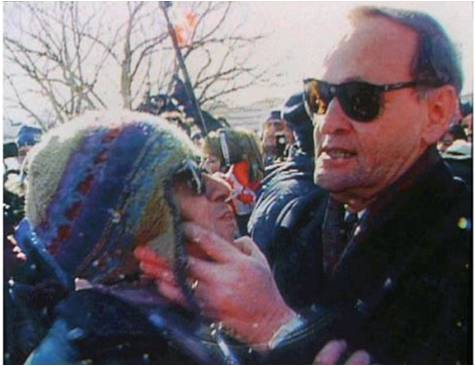
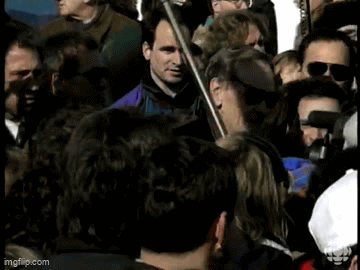
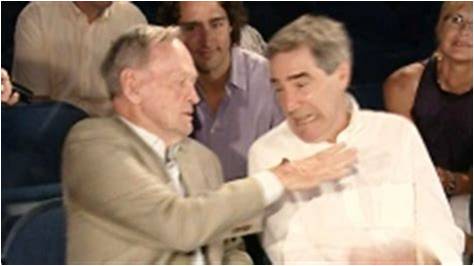
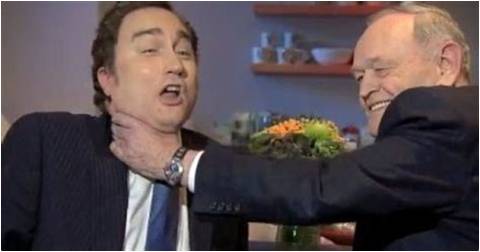
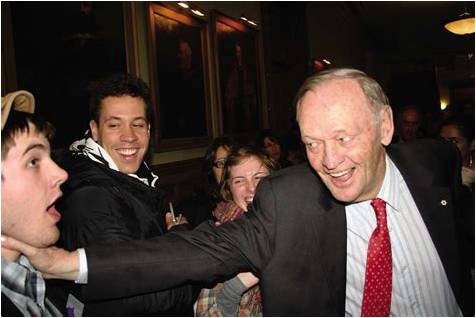

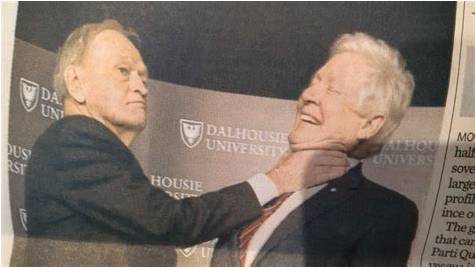

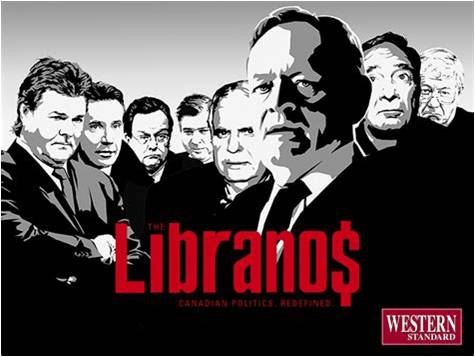

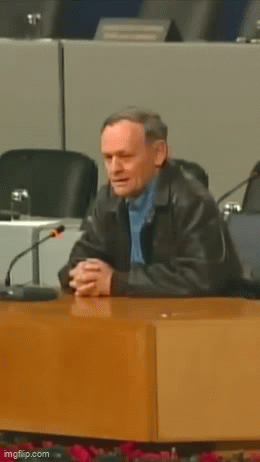
A small correction to the identity of the famous handshaken protester. Without going to the extent of resorting to the omniscience of Google, I am reasonably certain that the knit cap guy’s first name was Bill, and completely certain that tather than being a separatist, he was a fixture at anti-homelessness demonstrations in the Ottawa atea.
LikeLike
The protester was Bill Clennett, and he is more of a leftist than a Quebec sovereigntist. He was candidate for Québec solidaire in Hull at least once (after this incident with Chrétien), but he’s also an anglophone (though a perfectly bilingual anglophone with primarily francophone children). I don’t know if he supports Quebec independence; he might, but that’s not why he was at that demonstration.
LikeLike